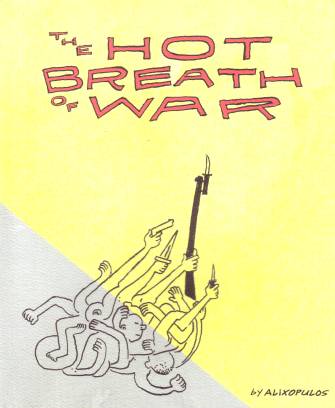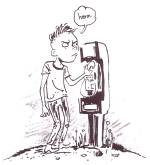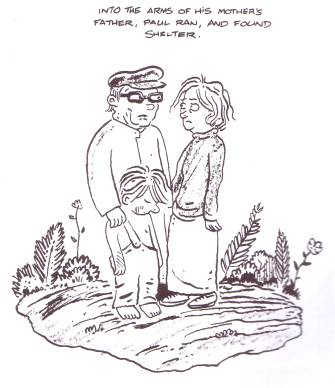 Home > CR Reviews
Home > CR Reviews The Hot Breath Of War
posted May 8, 2008
The Hot Breath Of War
posted May 8, 2008

 Creator:
Creator: Alixopulos
Publishing Information: Sparkplug, softcover, 128 pages, January 2008, $13
Ordering Numbers: 9780979746536 (ISBN13), 0979746531 (ISBN10)
I've been reading and re-reading Trevor Alixopulos'
The Hot Breath of War for about a full week now. I'm not sure if I've quite come to grips with it in terms of an appraisal; there's something about it that keeps slipping through my fingers. However, that's a quality in and of itself all too rare in today's rush towards the middle of the road, high-concept and easily defined. Also, as a small press book (it's from Sparkplug), it's entirely possible for this book to come and go without too many people knowing about it unless some (admittedly very modest) press becomes generated on its behalf. I hope that my fumbling around proves more of a boon than a hindrance in it finding additional readers.
 The Hot Breath of War
The Hot Breath of War combines the loose, single-image essay style that was popular briefly in the '50s and '60s and marries it to a series of short stories interconnected by happenstance and theme. That's where things get difficult, because Alixopulos' latest seems like a meditation on life through war and, in one or two places, vice-versa. In some of the more affecting moments, there's a sense that life is way too fragile to insert the horrifying weight of seizure and goal-taking through violence and death into its delicate mix. Yet there's also a vitality present in some of the non-war sequences that relates to the human desire to connect in some way, that suggests the out-sized roles we play in order to place ourselves exactly where we want to be include that of soldier and victim.
My only question is how well this holds together, whether or not the cartoonist gets a lot more power than he deserves by suggesting a better comic than the one we've in our hands in front of us, and nudging us into seeing and reacting to that comic rather than one he's made. That's a danger of comics; the reader can bring to the table so much that it's often confusing as to how much work they've put in and how much is actually there -- it's why mainstream American comic can offer fifth-generation knock-offs and to kids not used to seeing the real thing, they swoop in and crush with all the power of the more potent versions. I suspect that something related by not quite the same is what's at work here: that Alixopulos' ability to suggest and call into question certain ideas simply outstrips his idea to deal with them on the page, at least for now. But I'm not totally confident in that reading. I'm not totally confident about anything where this book is concerned, except that it surprised me and I think it might be very good.



